This is what happens when you ask for a gay cake in Canada
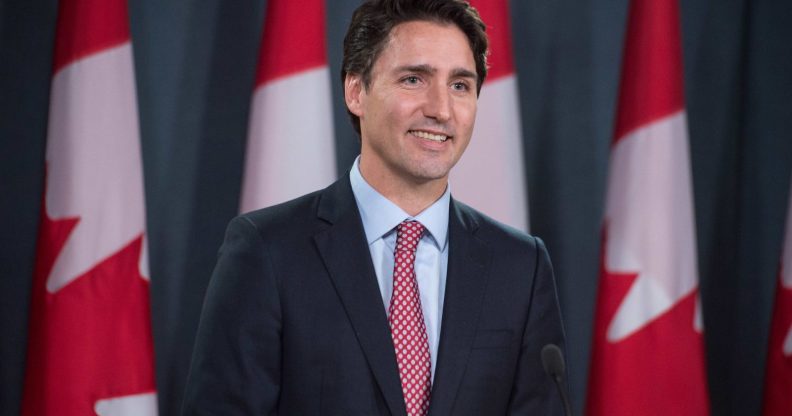
(Getty)
As courts in the US and UK hear cases concerning bakers who refused to make cakes for gay couples, Canada is showing everyone how it’s done.
Chris Farias, of Hamilton, Ontario, had made a special request to celebrate his impending marriage to partner Jared.
He contacted his local bakery with an usual request: make me the gayest cake you can.
And the bakery he picked, Hamilton’s Cake and Loaf Bakery, did not disappoint.
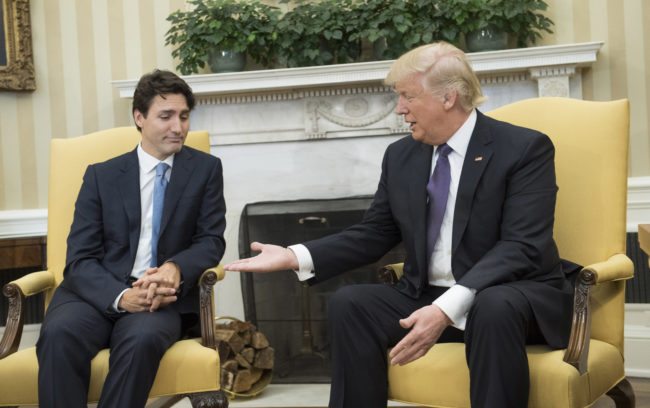
Donald Trump extends his hand to Prime Minister Justin Trudeau of Canada (Photo by Kevin Dietsch-Pool/Getty Images)
When the cake arrived for the happy couple, they discovered it had been extravagantly decorated with rainbows, flowers and a unicorn horn – and adorned with inclusive slogans like ‘Love is Love’.
Mr Farias said: “In celebrating my engagement to Jared Lenover (It’s been a year… 8 months ’till the big day!!) I wanted to get him a cake to celebrate (he loves cake…as do I!).
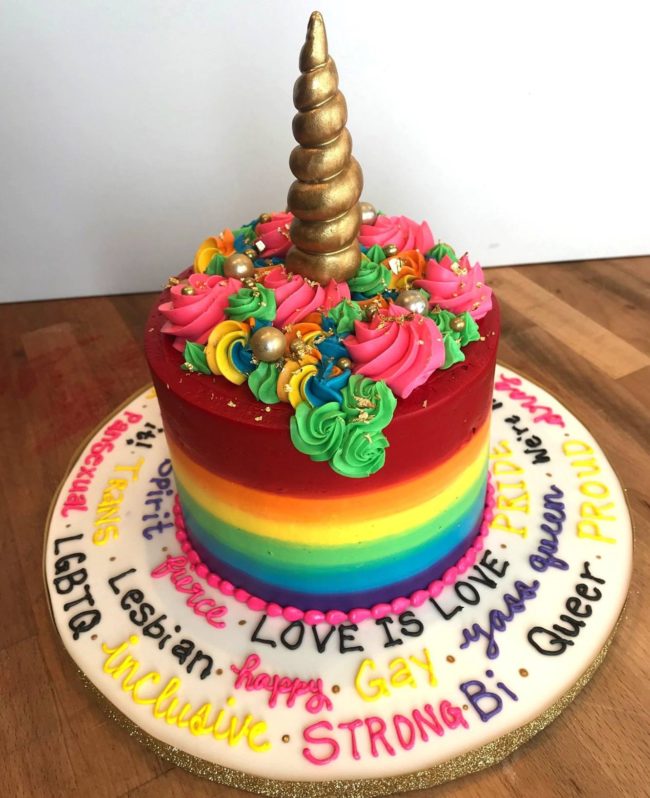
“So I called my local bakery, Cake and Loaf Bakery, and requested the GAYEST cake they could make. Without hesitation, and with much excitement, they said ‘We’ll do it!’.
“This is what I got. I am in tears right now I’m so happy.
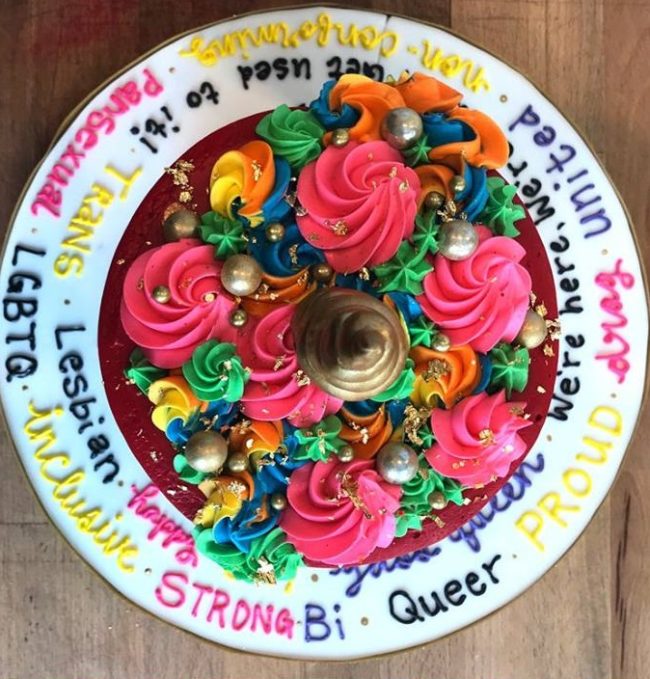
“Being part of the LGBTQ+ community isn’t easy for many. And that’s an huge understatement. But I am proud of who I am, and how far WE have come.
“I am proud to be a gay Canadian who can order a cake and not get turned down because of who I love. I love this country, and I love my community.
“If you believe that #LoveIsLove, please share, and show our neighbours to the south that we support them.
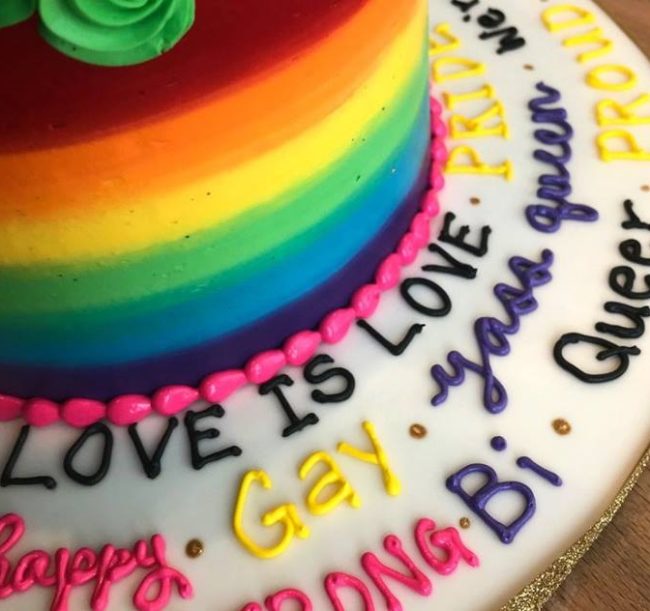
“That we empathize with their struggles. That Canada is loud and proud and will make them any cake their heart desires.”
The bakery added: “To our customers, employees and our community- the positivity that has been shared since creating this cake has made our hearts truly warm, and very proud to be Canadian.
“As a business we will continue to strive to have an inclusive, positive and safe environment for our customers AND employees- We will say it loud and proud, as often as we can… and hopefully, always with cake.”
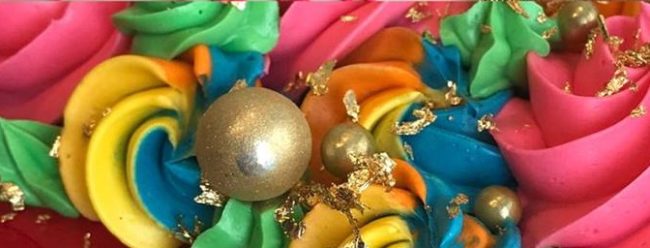
And that, folks is how it’s done – and how to ensure you’re going to get a lot more business, judging by the thousands of warm comments on the Facebook post
Meanwhile, south of the border, last week the Trump administration appeared before the Supreme Court to argue that businesses like bakeries should be free to discriminate against gay people.
Jack Phillips of Colorado’s Masterpiece Cakeshop launched a legal challenge to Colorado’s anti-discrimination laws after refusing to serve gay couple David Mullins and Charlie Craig.
The baker refused to make a cake for the couple after he found out they were celebrating their wedding
Mr Phillips claims that Jesus Christ would discriminate against gay people, and continues to insist his religion requires discrimination against gay people.
As the Supreme Court heard the case, Solicitor General of the United States Noel Francisco delivered oral arguments as part of the baker’s defence on behalf of the Trump administration.
Appearing before the court, Francisco likened the gay wedding to the KKK.
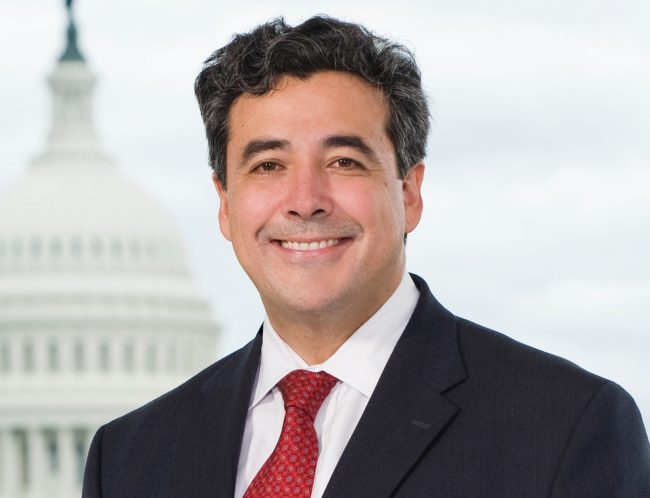
He said: “This case raises an important issue for a small group of individuals; namely, whether the state may compel business owners, including professional artists, to engage in speech in connection with an expressive event like a marriage celebration to which they’re deeply opposed.”
He added: “Is the thing that’s being regulated something we call protected speech? I think the problem for my friends on the other side is that they think the question doesn’t even matter. So they would compel an African American sculptor to sculpt a cross for a Klan service.”
The Trump official claimed it was “a narrow category of services that do cross the threshold into protected speech”.
Incredibly, Francisco appeared to answer in the affirmative when Justice Kennedy asked if the baker could “put a sign in his window [saying] ‘we do not bake cakes for gay weddings”.
Francisco said: “Your Honor, I think that he could say he does not make custom-made wedding cakes for gay weddings, but most cakes would not cross that threshold.”
Asked if the argument was an “affront to the gay community”, Francisco added: “I agree that there are dignity interests at stake here, and I would not minimize the dignity interests to [the gay couple] one bit, but there are dignity interests on the other side here too.”
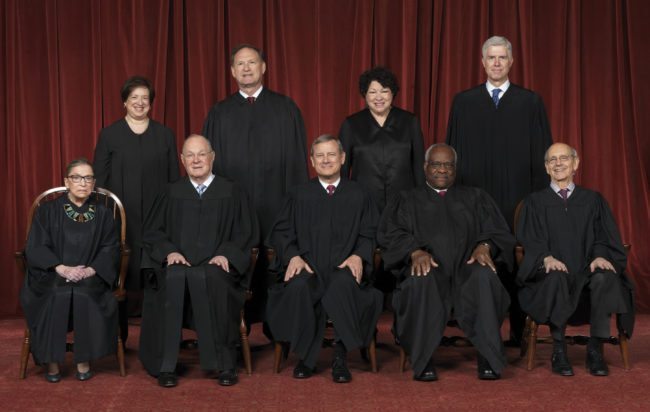
The Supreme Court justices
Justice Sotomayor latched on to the claim.
She said: “We live in a society with competing beliefs, and all of our cases have always said where LGBT people have been humiliated, disrespected, treated uncivilly.
“The briefs are filled with situations that the gay couple who was left on the side of the highway on a rainy night, people who have been denied medical treatment or whose children have been denied medical treatment because the doctor didn’t believe in same-sex parenthood, et cetera.
“We’ve always said in our public accommodations law we can’t change your private beliefs, we can’t compel you to like these people, we can’t compel you to bring them into your home, but if you want to be a part of our community, of our civic community, there’s certain behaviour, conduct
you can’t engage in.
“And that includes not selling products that you sell to everyone else to people simply because of their either race, religion, national origin, gender, and in this case sexual orientation.
“So we can’t legislate civility and rudeness, but we can and have permitted it as a compelling state interest legislating behaviour.”
The Trump official responded: “We don’t think you can force a speaker to join the parade.
“Because when you force a speaker to both engage in speech and contribute that speech to an expressive event that they disagree with, you fundamentally transform the nature of their message from one that they want to say to one that they don’t want to say.”
Elsewhere, Supreme Court Justice Kagan asked whether any extension of rights for “artistic expression” could be used more widely to license discrimination.
She asked: “How do you draw a line? How do you decide, oh, of course, the chef and the baker are on one side, and the florist is on that side, the chef, the baker, the florist, versus the hairstylist or the makeup artist?
“I mean, where would you put a tailor, a tailor who makes a wonderful suit of clothes? Where does that come in? The baker is engaged in speech, but the chef is not engaged in speech?”
Justice Kagan also asked whether the hypothetical exemptions from anti-discrimination laws would apply to people who object to interracial or interreligious marriage on religious grounds.
The justices also asked whether the arguments for discrimination against gay couples would also “trump public accommodation laws against
discrimination protecting customers [based on] race”
Despite the rigorous grilling from the liberal justices, experts say that the court’s conservative majority appeared sympathetic to the baker’s case, raising concerns from LGBT rights activists.
The court will not making its public ruling on the case for several months – leaving LGBT rights dangling in the balance.
The UK Supreme Court is also set to take up a similar case concerning a bakery in Northern Ireland.

